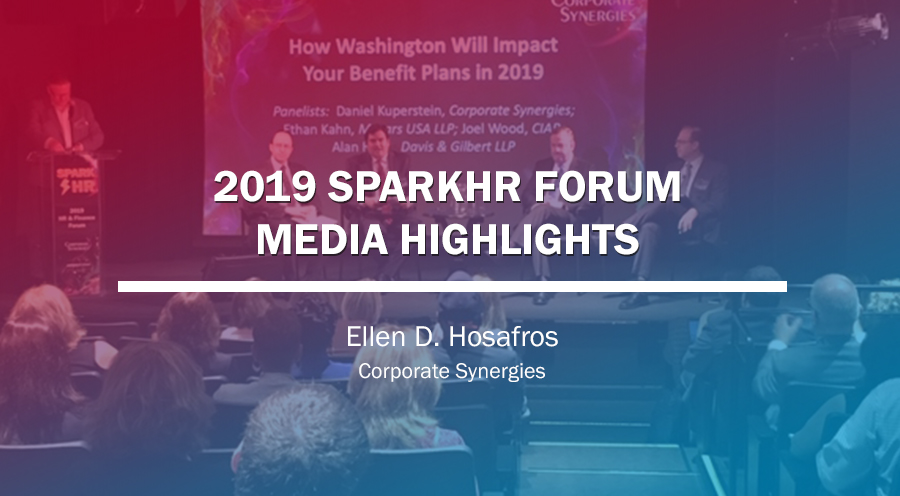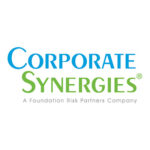Corporate Synergies’ subject matter experts presented their benefits compliance, voluntary benefits and employee engagement insights at their SparkHR forum earlier this month in New York City. The New York forum, one of three live events presented annually by Corporate Synergies, received extensive coverage by Employee Benefit Advisor (EBA) and its sister publication, Employee Benefit News.
Below are excerpts of EBA’s coverage of the SparkHR forum in New York:
2019 SparkHR Forum Participant Feedback:
“I attended SparkHR to educate myself and be aware of compliance; I learned from every session I went to.”
“Very knowledgeable speakers.”
“Great presenters, relevant topics, good pacing.”
“Well organized and kept to relevant topics with on-point presentations.”
“The updates and new materials received were so helpful in maintaining compliance.”
“I’ll be able to put into practice what I learned today right away.”
“The information is always current; the topics are relevant.”
“How Washington Will Impact Your Benefit Plans in 2019”
Corporate Synergies’ Panelist: Daniel Kuperstein, Senior VP of Compliance
Legislation on surprise billing is getting bipartisan support — and employers should be paying attention. In mid-May, Sen. Bill Cassidy, R-La., and Sen. Maggie Hassan, D-N.H., introduced their version of a surprise medical bill legislation, the STOP Surprise Medical Bills Act, which would prohibit balance billing in certain scenarios such as receiving emergency care at an out of network hospital.
“The patient can wind up with a bill for out-of-network care. [It is a] big problem that both Democrats and Republicans have tried to tackle,” said Dan Kuperstein, senior vice president of compliance at benefits firm Corporate Synergies.
Read EBA’s article here.
“Using Benefits to Curb Employee Stress”
Corporate Synergies’ Presenter: Gary Cassidy, Director of Employee Education, Communications and Wellness
Unengaged employees cost the U.S. between $483 billion to $605 billion a year in lost productivity. But benefits like student loan assistance, mental health support, parental leave and onsite childcare may be able to move the needle, said Gary Cassidy, director of employee education, communications and wellness at benefits firm Corporate Synergies.
“You’ve got to understand your people so you can understand their stress [and] so you can understand what’s driving their stress,” he said speaking Tuesday at SparkHR, an HR and finance forum in New York.
Serious disengagement could lead to burnout, Cassidy said. The World Health Organization classified burnout as an official diagnosis in May. The WHO defines burnout as “a syndrome conceptualized as resulting from chronic workplace stress that has not been successfully managed.” Symptoms of burnout include mental exhaustion, entertaining negative or cynical feelings about a job and reduced productivity.
Read EBN’s article here.
“This is the Voluntary Benefit Clients are Clamoring for”
Corporate Synergies’ Presenter: Nicholas Park, Senior Benefits Consultant
Ask Corporate Synergies Benefits Consultant Nicholas Park what voluntary benefit clients are most interested in and he has a rapid response. Student loan repayment programs top the list as the most requested benefit addition for employers, Park said, speaking Tuesday at Spark HR, an HR and finance forum in New York. That’s due to employers’ increasing focus on helping their employees improve their financial well-being.
There is a fear that the nearly $1.5 trillion in student debt will have long-term implications for workers and their employers, he added.
“[Student loan debt] is a balloon,” Park said. “It’s almost like the housing market in 2007; there’s an underlying implication that this could potentially blow up.”
Read EBA’s article here.
In addition to SparkHR forums, Corporate Synergies hosts benefits compliance webinars throughout the year. Here’s what’s coming up:
Rule Reversal: The Impact of AARP v. EEOC on Your Wellness Plan
In this case, the Court vacated portions of the EEOC’s employer-sponsored wellness plan regulations, which involves the ADA and GINA. This presentation will examine the impact of the AARP decision and its “rule reversal” on your wellness plans, and focus on the most important steps that your organization can take to make sure your wellness plan is functioning, fit and in compliance. We will also review other recent health & welfare compliance-related developments and discuss some real-life examples of what to do and what not to do with your wellness program. Approved for 1 SHRM PDC and 1 HRCI credit.





